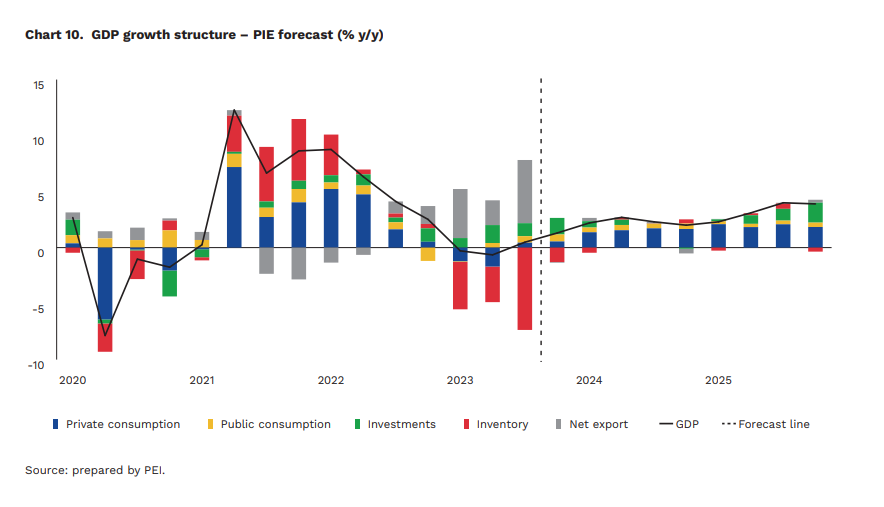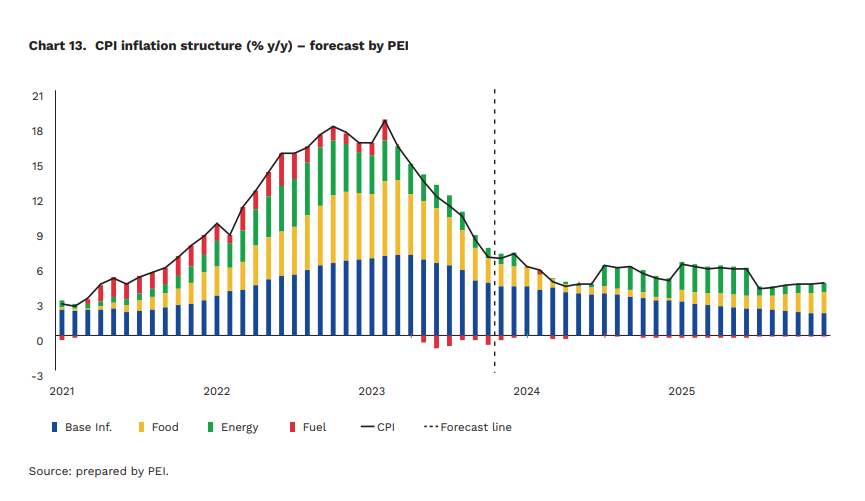Poland’s GDP growth in 2024 to reach 2.3 %
Published: 22/01/2024
Poland and the EU economy are slowly recovering from the slowdown. Poland's GDP in 2023 grew by 0.3 %, which is close to the average for the 27 EU countries - the European Commission estimates 0.6 %. A rebound is expected next year. Poland's economic growth in 2024 should oscillate around 2.3 %, while in the EU the Commission optimistically forecasts 1.3 %. Inflation is also systematically slowing down. Its average value in Poland in 2023 amounted to 11.6 %. In the following year, the rate of price growth will fall to 5.1 %. At the same time, a two-digit rate of salary growth will be maintained, which in 2024 will amount to 10.3 %. These are the conclusions that can be drawn from "Economic Review PEI: Winter 2023", a report published by the Polish Economic Institute.
Economic growth in Poland and the EU to accelerate in the next two years
In 2023, the European Union avoids recession, though GDP growth will be weaker than forecast. The European Commission estimates that the community’s economic growth will slow down from 3.4 to 0.6 % in 2023. The following year, however, will be better. The EC forecasts that the EU’s GDP will grow by 1.3 % in 2024. The only economy to fall into recession will be Sweden, with a fall in GDP of 0.2 %, mainly due to problems in the local property market. However, the Commission’s forecasts are relatively optimistic – the market consensus today is for growth of no more than 0.9 % y/y.
Poland, similarly to the EU, is also on the path of economic growth. The year 2023 will close with GDP reaching 0.3 %. In 2024, we expect an acceleration, i.e. economic growth should oscillate close to 2.3 %. It should be noted, however, that against the background of the Polish economy’s performance to date, such achievements are still modest.

“The main driver of growth will be household consumption. However, the coming year will bring minor perturbations in investment. These will return to rapid growth in 2025 – in addition to an improved economy globally, growth will also be supported by programmes from the National Recovery Plan. With these, we can expect GDP growth to accelerate to 3.5 % in 2025,” points out Jakub Rybacki, Head of the PEI Macro team.
Inflation lower, yet declining more slowly
In this March, we could see a significant slowdown in price growth, with the CPI dropping from 18.6 % in February to 6.5 % in November. This trend will continue in 2024, but no longer so sharply. We forecast that inflation will average 5.1 % in 2024, which is little change from current performance. The problem will be the stickiness of core inflation and the increases in energy prices in H2. Against this backdrop, food prices will rise slightly, but fuel prices will fall.
“Inflation will remain above the NBP’s target also in 2025. We expect high growth in service prices and core inflation. Energy prices will also make a significant contribution – this will still be the effect of restoring market prices after the energy shock. Inflation will additionally be raised by almost 1 pp. due to the restoration of a higher VAT rate on food. At the end of 2025, inflation should be close to 4.5 %. Once the regulatory changes are removed, such a result should coincide with the upper range of the permissible fluctuation band for the NBP target,” forecasts Sergey Druchyn, Senior Analyst in PEI’s macroeconomics team.

Salaries to increase
Since H2 2023, the purchasing power of consumers has been increasing again with wealth steadily improving. In Q4, wages are around 11 % higher than a year ago, while inflation has fallen to 6.5 %. Such a difference has so far tended to appear only in periods of consumer boom – today it represents a catch-up from last year. Nevertheless, the rate of wage growth will slow down. The results of economic surveys signal lower wage pressure. Fewer and fewer companies surveyed by the National Bank of Poland are announcing an increase in wages – the percentage fell from 43.1 % to 37.6 % in Q4.

“The high rate of wage growth will be linked to administrative decisions. January will see the minimum wage rise by 22 % y/y. There will also be significant increases in education and the budgetary sphere. Therefore, we expect wage growth to remain high despite the slowdown,” comments Sebastian Sajnóg, an analyst from PEI’s macroeconomics team.
***
The Polish Economic Institute is a public economic think tank dating back to 1928. Its research primarily spans macroeconomics, energy and climate, foreign trade, economic foresight, the digital economy and behavioural economics. The Institute provides reports, analyses, and recommendations for key areas of the economy and social life in Poland, taking into account the international situation.
Media contact:
Ewa Balicka-Sawiak
Press Officer
M: +48 727 427 918
E: ewa.balicka@pie.net.pl
Category: Macroeconomics / Report / Reports 2023





